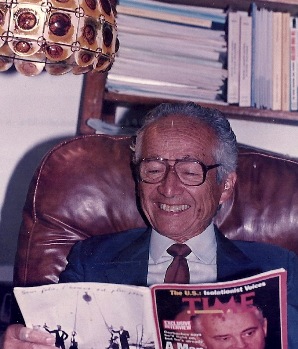 Hugo Behm-Rosas died peacefully on April 28 in his home in San José, Costa Rica in the company of his two children Ingrid and Jorge, his younger brother, as well as grandchildren and great-grandchildren.
Hugo Behm-Rosas died peacefully on April 28 in his home in San José, Costa Rica in the company of his two children Ingrid and Jorge, his younger brother, as well as grandchildren and great-grandchildren.
Doctor Behm-Rosas, a physician, was one of the most important social epidemiologists and demographers of Latin America, although above all he was a humanist. He was member of the IUSSP since 1955.
Hugo Behm-Rosas was trained as a physician and an epidemiologist at the University of Chile, as well as in the USA at Johns Hopkins and Columbia universities.
In addition to his clinical practice at public hospitals in Chile, the young Doctor Behm-Rosas conducted epidemiological research on tuberculosis and respiratory infections. After studying biostatistics, epidemiology and demography, he became professor and later Director of the School of Public Health at the University of Chile. His 1962 book on infant mortality and standards of life in Chile is used as a textbook even today.
Being director of the School of Public Health, Behm-Rosas was incarcerated during 15 months by the Pinochet dictatorship. His crime: his beliefs in social justice and his studies showing the social inequalities in health and infant mortality in Chile. The late Hugo Behm-Rosas used to remember fondly his time in prison as perhaps the best of his life and as a formative period in which he learned the true meaning of solidarity and the ways of living of his fellow, working-class inmates.
Behm-Rosas went from the Pinochet’s Ritoque Concentration Camp to asylum in Costa Rica in September 1975, a country where he ended his career as an outstanding demographer of the Latin American Demography Center (CELADE). His studies on the social inequalities of child mortality in Latin America are well known worldwide.
Behm-Rosas was in the 1980s member of the IUSSP committee on the Factors affecting Mortality and the Length of Life. In that period he was coeditor of two IUSSP books on the social determinants of mortality and on methods to study mortality.
Among his many students and collaborators, Hugo Behm-Rosas is remembered for his humanism, his commitment to social justice and his concern for the destitute. He taught us to use biostatistics and demography to improve the world and to fight social inequality.
